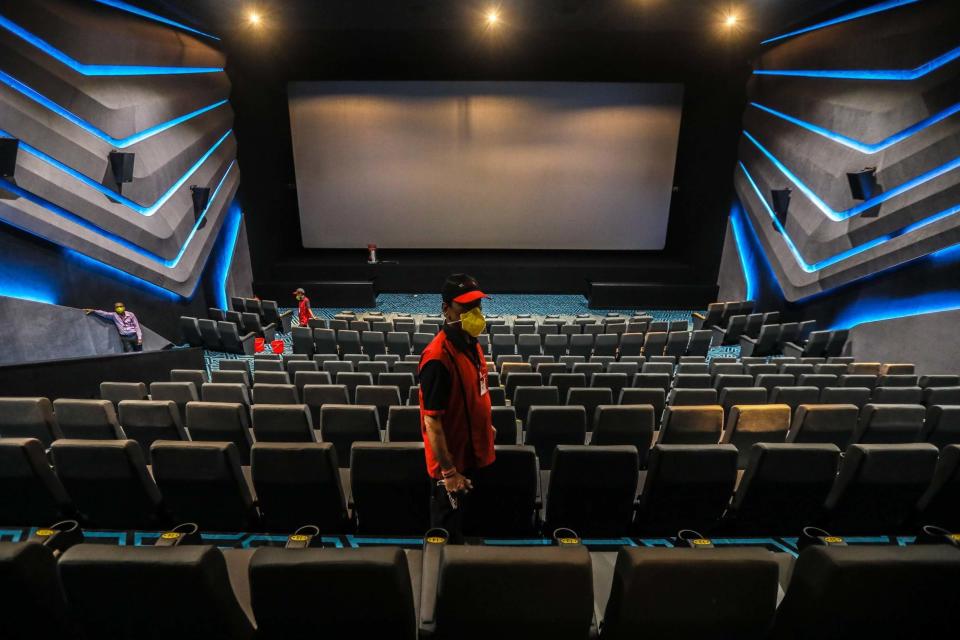Savour the shows you’re bingeing on – the people behind them are losing their jobs

Right now, the arts are in trouble and in need of assistance. Film releases have been delayed, cinemas closed. music and literature festivals cancelled, tours canned and filming for television series put on indefinite hiatus. When the storm passes and a version of normal life resumes, many of the institutions and individuals who cater to our cultural needs will be unable to recover. Imagine going to your local theatre, bookshop or music venue only to discover it has been permanently boarded up – because, without intervention, this is what we are facing.
There will be those who view the arts as a luxury and an inevitable casualty at a time of extreme crisis. With lives at stake, there’s no disputing that the cancellations and closures are entirely necessary. But to dismiss the value of culture at such a time is to overlook that which brings colour to our existence and makes life worth living – not to mention its huge contribution to the economy.
It’s significant that, under lockdown, we are collectively turning to the arts to pass the time. Newspapers and magazines are awash with lists of books to read, box sets to binge, radio programmes, podcasts and albums in which to immerse ourselves. But the people who created this work – from actors, directors and writers to editors, technicians, designers and producers – will now have little means of support.
Meanwhile, in a state of affairs that one might politely call financial distancing, the government has continued to drag its feet in providing help for the self-employed, who make up the majority of workers in the creative industries (so far sole traders have been advised to sign up for universal credit).
A package for freelancers is due to be announced later today – earlier in the week, a government source revealed Rishi Sunak has been “kicking the tyres” on a number of options, a phrase that will hardly bring comfort and confidence to the scores of self-employed workers who live week to week and for whom financial wipe-out is a very real prospect.
Of course, a lack of resources and financial backing is something to which arts workers have long been accustomed. Ten years of austerity has seen to that. Thus, in the face of government inaction, we have already seen some brilliant and resourceful initiatives from across the art world in a bid to look after its own. In the past week, I have seen online fundraisers for struggling venues, along with Facebook pages given over to helping artists with financial applications. Emergency funds for individuals are also springing up: the Society of Authors has set up a fund for those authors who face indefinite postponement of book tours, launch events and lectures; the Musicians’ Union has created a hardship fund that will pay out small grants to out-of-work musicians; and the BFI and the Film and TV Charity are raising money for those in the industry unable to earn. The Arts Council has just announced a support package which includes £20m for individuals, made up of grants of £2,500 per person.
Meanwhile, performers and writers are finding new ways to reach audiences stuck under house arrest. Following the cancellation of major festivals including Glastonbury, Edinburgh International Festival, Brighton Festival and scores of smaller events, alternative online festivals dedicated to music, literature and live performance are being thrown together as we speak. Theatre companies are already streaming shows online, with new works being created for the virtual sphere. Online book groups and author readings are multiplying while, on social media, established authors are generously flagging up those whose debuts are publishing just as the world shuts down.
Earlier this week, James Blunt played to an empty auditorium in Hamburg – insert your own joke here – having opted to live-stream the show to the public. Elsewhere, galleries and museums including the British Museum, New York’s Guggenheim and Amsterdam’s Van Gogh Museum are offering virtual tours that you can take from the safety of your sofa. The energy and kindness with which arts people are trying to keep the creative wheels turning is properly heartwarming. As well as giving purpose to creative minds, such enterprises are food for the nation’s soul.
Nonetheless, those putting together online projects know they are merely applying sticking plasters to a life-threatening wound. In the past week, we have been asked to support our local business by buying food from local shops and ordering takeaways from restaurants that have closed their doors. We should be doing the same for our arts community – as the government prevaricates, it’s up to us to give what we can to emergency funds, donate to struggling venues, download an album or podcast or order a book (preferably not on Amazon). In these anxiety-inducing times, art isn’t just a distraction – it’s a lifeline and it must be protected.
Read more
Why The Masked Singer might just save Saturday night TV
Why Hachette were wrong to cancel Woody Allen
Musicians explain why it's essential to support your local music venue

